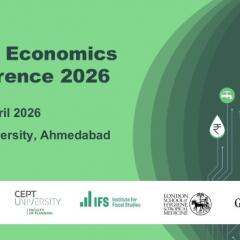
Empowering National Development: Leveraging Earth Observation Intelligence

Event
Mon, October 14, 2024 - Tue, October 15, 2024
Balwantrai N. Brahmbhatt Hall, CEPT University
Registration ClosedOverview
Earth observation (EO) is highly significant for a whole variety of applications, from climate research and urbanisation processes to land administration. One key focus is the use of Earth observation data to support sustainable developments and deal with global challenges. In view of extreme weather events, loss of biodiversity and pressure to urbanise, Earth observation data provides essential information for efficient adaptation and mitigation strategies.
The EO segment is the commercial anchor of the space sector – driving innovation, jobs, revenues, and ensuring delivery of services that impact the lives of people. Space-based imagery is increasingly functioning as an enabler of commercial applications and public services and supporting service delivery in almost all sectors of the global economy. In the evolving digital economy, space-based imagery is becoming a component of the broader digital infrastructure, with its integration into the wider data value chain.
Developments in frontier technology like Artificial Intelligence and Machine Learning, are contributing to faster and efficient collection and processing of data, and driving a shift from imagery to insights, which enable provision of intelligence to diverse customers across sectors. Enhanced image intelligence also unlocks innovative use cases and new opportunities for collaboration. With unprecedented access to image intelligence, the users from government agencies and commercial market need to explore measures to unlock value for customers, and society as a whole.
Objectives:
- Raise awareness among national stakeholders about the potential applications and benefits of EO information and knowledge.
- Enhance understanding of the role of EO in addressing national priorities, including sustainable development, environmental management, disaster risk reduction, and climate change adaptation.
- Foster knowledge exchange and sharing of best practices in EO data acquisition, processing, analysis, and utilization.
- Facilitate networking and collaboration among national and regional stakeholders involved in EO activities, including government agencies, research institutions, academia, industry, and civil society organizations.
- Identify opportunities for joint initiatives, partnerships, and resource mobilization to support EO-related projects and programs at the national level.
- Discuss policy frameworks, regulations, and governance structures needed to support the effective utilization of EO information and knowledge at the national level.
Why to attend?
- Convergence of Geospatial & Emerging Technologies
- Connecting Communities
- Sharing of Good Practices and Ideas
- Forging Collaborations & Policy Advocacy
- Knowledge Expansion & Diverse Perspectives
Who should attend?
- Government, Public Enterprises, Multilateral Agencies, Policy Makers
- Technology & Service Providers, System Integrators, Engineers
- Urban Planners, Environmentalists, Cartographers, Surveyors
- Consultants, Academia, Researchers, Students
- Business Enterprises, Consumers, Users, Industry Leaders
- Start – ups, Incubation hubs
Co-Host:

Strategic Partners:

Institutional Partners:




Industry Sponsor

Academic Sponsor

Day 1: 14th October 2024
-
TIME
SESSION TOPIC
-
9:30 AM - 10:00 AM
Registration
-
10:00 AM - 10:10 AM
Welcome Address
-
10:10 AM - 10:30 AM
Opening Keynote Address
"Earth observation for a world in transition - global monitoring and local action" -
10:30 AM - 11:30 AM
Opening Session : Earth Observation (EO) for National Development
- Impact of national policies and regulation of EO systems and data
- International agreements and frameworks governing EO activities
- Role of stakeholders in promoting and advancing the EO technologies
- Importance of open data policies and data sharing agreements in promoting the availability and accessibility of EO data
- Long term vision for the integration of EO in national development strategies.
-
11:30 AM - 12:00 PM
Tea Break
-
12:00 PM - 01:30 PM
Session 1: Technology convergence powering in EO segment
- Technology innovation and advancements in EO
- Integration of frontier technology with space-tech
- Technology integration enabling innovative space-based solutions delivering image intelligence
- Enterprise-level image intelligence solutions and its impact on business outputs across domains
-
01:30 AM - 02:30 PM
Lunch Break
-
02:30 AM - 04:30 PM
Session 2: Earth Observation for Climate Resilience
- Emerging trends and future directions in EO for climate resilience.
- EO for managing the green transition
- Role of EO in monitoring key climate variables such as temperature, precipitation, sea level rise and GHG concentration
- Integration of EO with climate models
- Informed climate resilience practices in various sectors using EO data
Day 2: 15th October 2024
-
TIME
SESSION TOPIC
-
10:00 AM - 11:30 AM
Session 3: EO for Disaster Management & Emergency Response
- Current and emerging use cases of image intelligence in disaster management sector
- Multi-hazard disaster risk and resilience
- Early Warning Systems – A Key Tool to Reduce the Impact of Disasters
- Challenges in adoption of image intelligence in the sector
-
11:30 AM - 12:00 PM
Tea Break
-
12:00 PM - 01:30 PM
Session 4: EO for Enabling Efficient Land Administration
- Modernization of land administration and its impact on national development
- Evolving Role of geospatial and frontier technologies in enabling sustainable land administration
- Data-enabled approach to govern India's common lands
- Collaborations in land and property sector: Existing challenges and success stories
-
01:30 PM - 02:30 PM
Lunch Break
-
02:30 PM - 04:30 PM
Session 5: Earth Observation for Sustainable Urban Development
- Connected information ecosystem enabling integrated urban governance
- EO infrastructure and its impact on urban development
- Digital transformation enabling resilient sustainable urban development
- Observing urban growth and planning smarter, more sustainable cities
| Category | Early Bird Registration Fee (Valid till August 30, 2024) |
Registration Fee (Post August 30, 2024) |
|---|---|---|
| Private Companies | 13000 | 15000 |
| Government Organizations | 10000 | 12000 |
| Academia / NGOs | 6000 | 8000 |
| PhD Scholars / Students | No Cost | No Cost |
| Current CEPT Students and Employees | No Cost | No Cost |
* Registration is now open.
**All costs are inclusive of GST.
For sponsorship opportunities
Nikunj Pithwa Nikunj.pithwa@cept.ac.in
For speaking opportunities
Vagmi Patel Vagmi.patel@cept.ac.in
For general inquires
Upcoming Events


Reframing Vernacular Architecture for a Decolonised World
February 26, 2026CEPT University, Ahmedabad, India











































